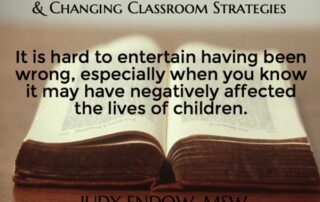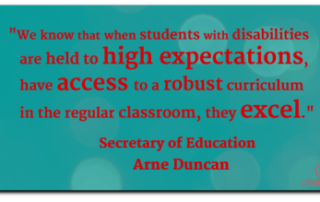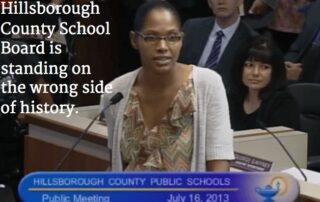Autism and Changing Classroom Strategies
The field of autism is very new – not even 100 years old yet! This means we are constantly learning new things. We now know that what works for most children to learn does not always work for autistic children. In fact, it can be detrimental to their learning. Those of us in the field of autism will likely need to change the way we deliver help to those who seek it and change the way we teach our students.
Students with Disabilities Excel with High Expectations, Access, and Inclusion
"We know that when students with disabilities are held to high expectations, have access to a robust curriculum in the regular classroom, they excel." Secretary of Education , Arne Duncan Until recently, the Department of Education's primary focus was evaluating states compliance meeting procedural requirements- timelines for evaluations, due process hearings and transition services. Under the new framework, Results-Driven Accountability (RDA), the Department will also include educational results and outcomes for students with disabilities in making each state’s annual determination under the Individuals with Disabilities Education Act (IDEA). “Every child, regardless of income, race, background, or disability can succeed if
How AAC and assistive tech make classrooms better for all : Paula Kluth
In 2009, I published an article in The Reading Teacher with my colleague, Kelly Chander-Olcott, titled “Why Everyone Benefits from Including Students with Autism in Literacy Classrooms”. One of the points we make in the article is that students with disabilities often bring assistive technology and augmentative communication into classrooms and, therefore, make them richer places to learn. Students with and without disabilities who are in classrooms that use AT and AAC regularly and creatively not only may get access to unique materials, but also get to learn about learning itself. They may be able to generate ideas for using
Transforming Education to Benefit ALL Students
As part of a 5-year, $24.5 million grant awarded by the U.S. DOE , the SWIFT Center was founded to assist districts and their schools to engage in a transformational process, in order to achieve equity and excellence for all students. Research has demonstrated that inclusive education significantly improves academic and behavior outcomes for all children.
We Are Not In Our Own World
We need to be careful about how we think about and talk about people with disabilities. One example is the reference that those who are autistic or deaf or blind or have some sort of movement differences are “in their own world.”
Disabilty and Civil Rights: Standing On the Right Side of History
"If we were to go back to the 1960s and we were to talk to those leaders who were vehemently against desegregation, we would hear the conviction in their voices of them stating why they believe their decisions and what they were doing to those children were just. Just as I believe that some of you and some of the board members that have spoken believe that their decisions are just. But, I fear that the Hillsborough County School Board is standing on the wrong side of history."
Inclusion is a right not a privilege.
Inclusion is not only socially just, but research shows it improves academic outcomes for all students.
I Am Here To Make A Difference For My People
"I am here to make a difference for my people. I hope that you listen to what I have to say. I want people like you to stop judging me." Tres Whitlock
PrAACtical AAC | Presuming Competence and Using The Least Dangerous Assumption
PrAACtical AAC's latest post on the importance of presuming competence.
Game Changer: Florida Senate Unanimously Passes Special Education Bill
The Florida Senate unanimously passed Bill 1108 on April 29th.
Some special education teachers fear losing jobs
ATLANTA (AP) — Some Atlanta special education teachers say they fear they could lose their jobs if they aren't certified to teach in another subject. Keith Butler helps special education students with math in an Atlanta high school. He said teachers are
Law Would Give Parents Final Say About Special Diploma Track
A proposed law moving quickly through the Legislature would give parents of kids receiving special education services the final say about their child’s placement on a special diploma track.
Neurodiversity in the Classroom: Strength-Based Strategies t – Apr 29,2013
A new concept on human diversity has emerged over the past 10 years that promises to revolutionize the way educators provide services to students with special needs: neurodiversity. Just as we celebrate diversity in nature
Lawsuit alleges school bus aide slapped autistic boy
A north suburban special education school bus aide slapped an autistic student who cannot speak, according to a lawsuit filed by the boy’s mother, who claims she uncovered the alleged abuse after putting a recording device in her son’s backpack. Nabiha Z
Congress Changes Special Education Funding Regulations
This month, Congress clarified how states that fail to adequately fund special education services from year to year will be penalized. The changes to IDEA regulations, put forth by the Obama administration, are said have “broad support on Capitol Hill”. Special education funding is governed by “maintenance of effort”, or a regulation stating that funding levels must maintained or increased from one year to the next. States need special permission and a waiver from the federal government to be exempt from meeting maintenance of effort in any given year, or they may find themselves facing serious consequences. South Carolina and
What’s the Difference between Reduction in Homework and Shortened Assignments?
By Kori Hamilton and Elizabeth Kessler, professional special educator and NICHCY advisor. Being able to provide ample opportunities for success to all students requires a clear understanding of the needs of each individual student. Every student has a unique learning style, and some students require more help than others. Students who receive special education services have a plan in place to identify the type of support(s) that’s needed. One type of support is an accommodation, which is a change that helps a student overcome or work around the disability. A modification, which is a change in what is being taught
Time for a Paradigm Shift in Special Education
Thomas Armstrong's piece on neurodiversity and education.
Ten Things I wish My Teacher and SLP Knew about AAC : Pat Mervine
Pat Mervine has a great website and is the author of "How Katie Got a Voice (and a cool new nickname)" . I wish..... the entire team would be trained in how to program and use my AAC system. My "voice" shouldn't be taken away from me just because an adult is absent or busy. Oh, and a good back-up system would be much appreciated for when my device goes down. my AAC device would be charged (if electronic) and positioned for me to use it all times. Other kids can talk all day -- at recess, lunch, on the bus,
Abuse of 7 Year Old with Special Needs Recorded by School Intern
School intern videos abusive physical therapist shoving seven year old with special needs to the ground and saying, "Get down now. I said down. No.Stand up you little b----, stand up."
Wright’s Law: Why Schools Usually Say “No!”
My son is going to middle school. Same district, new school, just blocks apart. His 1:1 (same para for 3 years) has been the best thing that has come into his life ever. We want his para to follow him to middle school. The Special Education Director says
Motherlode Blog: Solving New York City Bus Strike’s Impact on Special Needs Students Isn’t Simple
New York City’s bus strike is disproportionately affecting one of its most vulnerable populations: children with special needs, whose symptoms or travel limitations can make it extremely challenging for their parents to get them to school using other met
Inclusion in Oklahoma
Ardmore City Schools has adopted a new program called Inclusion Education for students needing special services. Students, regardless of abilities, are kept in the general education classroom all day. "I believe in it wholeheartedly," said Carolyn Thomas, special services director. "The principal is to educate everybody. The method may be different and a different delivery, but the goal is to educate everybody." Before, students would be pulled out of class each day to receive instruction from the special education teacher. "At first, the students weren't sure and asked to come to my classroom," Knight said. "Now, they don't feel so
Attorney Says School District Abuse and Cover Up Was a “Mind-Set”
Parents of special needs students say school district covered up abuse.
Changing the Paradigm
Sir Ken Robinson on education reform. "Changing Paradigms in Public Education" covers the importance of thinking differently about human capacity , recognizing the benefits of collaborative learning, and changing the culture of our institutions.
I Am
How do you talk to someone who uses AAC?
Seth’s case: Special-education battles with no end
Posted at 01:09 PM ET, 11/04/2012 Nov 04, 2012 06:09 PM EST TheWashingtonPost Seth turns 9 on Saturday. He is a radiant child who often looks better than he feels. He was born nearly four months prematurely and weighed 15 ounces at birth. He has many med
Inclusive Education: It’s Great If You Can Get It
Inclusive schools need to become a reality for all students across the nation regardless of abilities, socio-economic background and geographic location. Unfortunately, many school districts do not see the inclusive classroom as the Least Restrictive Environment and an appropriate placement for children with special needs. Thus, what one child has free and appropriate access to, another one doesn’t. And then inclusion , which has been proven by experts to be the gold standard of special education, becomes an ideal situation…if you can get it. The lack of universal practice of inclusive education in our school system creates an overall discord in
Presume My Competence
Really, this is number one. Please presume my competence.
Focus on My Strengths
#4 Please focus on My Strengths. I have many. We all do.
Top 10 Things Autistic Self Advocate Needs Teachers to Know : # 3
Top ten things I want you to know. Number 3: Please talk directly to me, not to my support person.
Autistic Student’s Top 10 List for Teachers of Students with Special Needs #2
Top ten things Autistic student wants teachers, therapists and friends to know about students with special needs... they may be shocking to some of you, but hopefully to most they are exactly what you expect. Here's number 2.
A Sister Stands with Her Brother: I Am Heard, I Am Important, and I Am Included
No one wants to be the excluded one, the one to stand alone in silence, the one left out of the conversation. No one wants to be forgotten. So why are some individuals treated this way? Luckily it just takes one person to stand up and include, and the rest will follow. Be that person, take a stand, make a difference.
Inclusive Educational Practices for Students with Special Needs
Studies have shown when kids with disabilities are educated in inclusive settings, the classrooms are better for all of the students.
Outing The Prejudice: Making The Least Dangerous Assumption
We highly recommend this brilliant article by Zach Rossetti and Carol Tashie on their interpretation of Anne Donnellan's concept of presuming competence, the least dangerous assumption.
SEN / ICT
The sen / ict directory began life in August 2011 to act as a directory for Special Educational Needs and Information Communication Technology Resources. Companies can showcase their business, the products they produce and services they provide. There are also hundreds of FREE online resources from fun/educational games, activities and printable resources to tools that help disabled adults and children use computers and the internet by adapting and adjusting their technology. The sen / ict directory aims provide a central location for all your favourite resources, as well as introduce you to new ones you might not have found otherwise for your child
IEP Essentials Webinar
Thank you for supporting our mission. When a child qualifies for special education services, federal law requires the development of an Individualized Education Program. The IEP serves as a roadmap for services, including important information about a ch
Special needs system ‘shocking’
The report suggests provision of special needs education is patchy MPs have expressed shock that almost a third of 18-year-olds with special educational needs are not in any form of education, employment or train
Obama ignores special ed, again…
“Fully Funding the Individuals with Disabilities Education Act: Barack Obama has been a strong and consistent advocate for fully funding the Individuals with Disabilities Education Act (IDEA). Congress promised to shoulder 40 percent of each state’s “exc
The dirty little secret about ‘scream rooms’
Now that the dirty little secret about “scream rooms” is out, let’s hope legislators take notice and do something about this psychologically destructive practice employed routinely in special education schools across the state. As a parent of a child with autism who has spent many hours of his elementary school days in the rooms in various schools, I’ll say it straight: This is state-sanctioned, institutionalized child abuse. If I locked my kid in a closet it would be a crime. Yet some schools do it every day.
Wrightslaw
Wrightslaw's mission is to provide parents, advocates, educators, and attorneys with accurate, up-to date information about special education law and advocacy so they can be effective catalysts. * Information for parents about their rights and responsibilities * Information for teachers about professional training so they can meet the diverse needs of their students * Information for advocates about laws, regulations, and advocacy strategies * Information for attorneys who want cases, pleadings, and tactics and strategies
Office of Special Education Programs
The Office of Special Education Programs (OSEP) is dedicated to improving results for infants, toddlers, children and youth with disabilities ages birth through 21 by providing leadership and financial support to assist states and local districts. The Individuals with Disabilities Education Act (IDEA) authorizes formula grants to states, and discretionary grants to institutions of higher education and other non-profit organizations to support research, demonstrations, technical assistance and dissemination, technology and personnel development and parent-training and information centers. The Individuals with Disabilities Education Improvement Act of 2004 was signed into law by President George W. Bush on December 3, 2004. As the nation's special education law, IDEA serves approximately 6.8 million children and
Office of Special Education and Rehabilitative Services
The Office of Special Education and Rehabilitative Services (OSERS) understands the many challenges still facing individuals with disabilities and their families. Therefore, OSERS is committed to improving results and outcomes for people with disabilities of all ages. OSERS supports programs that serve millions of children, youth and adults with disabilities. OSERS is comprised of the Office of the Assistant Secretary (OAS) and three program components: the Office of Special Education Programs (OSEP), theNational Institute on Disability and Rehabilitation Research (NIDRR), and theRehabilitation Services Administration (RSA).
National Information Center for Children & Youth with Disabilities
NICHCY serves the nation as a central source of information on: ■disabilities in children and youth; ■programs and services for infants, children, and youth with disabilities; ■IDEA, the nation’s special education law; and ■research-based information on effective practices for children with disabilities.
Council of Parent Attorneys and Advocates
The Council of Parent Attorneys and Advocates’ mission is to be a national voice for special education rights and to promote excellence in advocacy. Their primary goal is to secure high quality educational services for children with disabilities. The Council of Parent Attorneys and Advocates (COPAA) is premised on the belief that the key to effective educational programs for children with disabilities is collaboration -as equals- by parents and educators. This is the premise of the Individuals with Disabilities Education Act (IDEA) and Section 504 of the 1973 Rehabilitation Act, the federal statutes that guarantee children with disabilities a free, appropriate
Charter Schools Excluding Students with Significant Disabilities in Florida
A new report by the Miami Herald and StateImpact Florida – a National Public Radio initiative - confirms CEC’s ongoing concern that many charter schools are failing to serve students with disabilities, particularly students with significant disabilities
The Gift of Knowledge
It’s been a couple of years now that I’ve been blogging about special education legal issues. Unfortunately, the realities of juggling a busy law practice, a family, and other professional commitments don’t allow me to do it enough, and I continue to ye
Certain Proof – A Question of Worth
Certain Proof: A Question of Worth is a feature documentary about three children living with significant communication and physical disabilities, who struggle against the public schools in an emotional battle to prove their worth.









